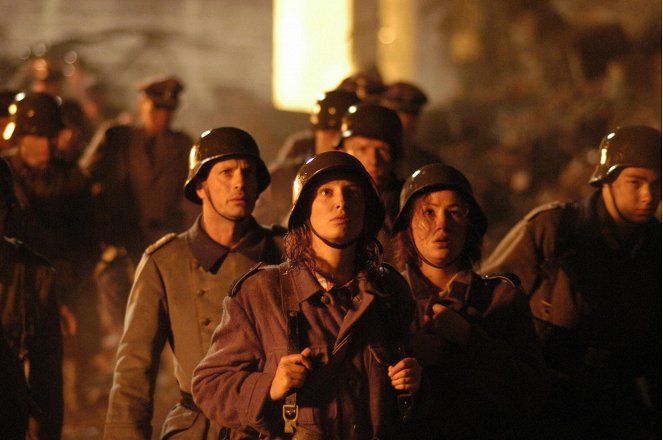Rendező:
Oliver HirschbiegelForgatókönyvíró:
Bernd EichingerOperatőr:
Rainer KlausmannZeneszerző:
Stephan ZachariasSzereplők:
Bruno Ganz, Alexandra Maria Lara, Corinna Harfouch, Ulrich Matthes, Juliane Köhler, Heino Ferch, Christian Berkel, Matthias Habich, Thomas Kretschmann (több)Tartalmak(1)
Berlin, 1945 április. Egy nép a bukására vár. A főváros utcáin kegyetlen harcok folynak. Hitler a katonai vezetőséggel és néhány hívével elsáncolja magát a vezetőségi bunkerben. A Birodalom helyzete a Vörös Hadsereg előrenyomulásával egyre reménytelenebbé válik. A folyamatos bombázások állandó rettegésben és életveszélyben tartják a város elkeseredett lakosságát. Miközben az utcákon kétségbeesés tombol, Hitler a Harmadik Birodalom teljes pusztulását a bunker falai között éli át. Jóllehet Berlint már lehetetlen tartani, a Führer tiltakozik a búvóhely elhagyása ellen - Albert Speer építészhez hasonlóan "a színpadon akar lenni, amikor legördül a függöny". Már csak néhány órája maradt, mielőtt közös öngyilkosságuk előtt feleségül veszi Eva Braunt. A vég elkerülhetetlenül közeleg, Hitler mindent az utolsó részletig kidolgoz: miután ő és szeretője meghalt, holttestüket a birodalmi kancellária udvarában fogják elégetni, nehogy a tetemük ellenséges kézre jusson. Az oroszok feltétel nélküli megadást követelnek, ezért hűséges hívei közül, vezetőjük példáját követve, többen is az önkéntes halált választják a rájuk váró kínkeserves meghurcoltatás helyett. A magát szintén a bunkerben meghúzó Magda Goebbels megmérgezi mind a hat gyermekét, majd férjével együtt véget vet életének. Röviddel ezután Hitler személyi titkárnőjének, a végsőkig kitartó Traudl Jungénak és még néhányaknak az utolsó pillanatban sikerül kimenekülnie a bunkerből, és átjutnak az oroszok ostromgyűrűjén. (Best Hollywood)
(több)Videók (3)
Recenziók (10)
Záró feliratok alatt soha nem tapasztaltam még ilyen csendes közönséget egy multiplex moziban. A bukás - Hitler utolsó napjai című film egy szerény remekmű, amely főleg a rekonstruált tartalom miatt erőteljes. A szóban forgó események súlya miatt. A képi világot tekintve ugyanis színházilag szigorú, belső térben játszódó ügy, amely a jelenetek legrealisztikusabb felfogásán és a színészek alakításán alapul. És ezek egyedülállóak. Nem csak Bruno Ganz, hanem a többi főszereplő is maximális odaadással játszik. A Goebbels házaspár alakító színészek jó választás, akiknek hidegvérűsége és a Vezér iránti egészségtelen odaadása szinte elnyomja Hitler démoni személyiségének rettenetes kifejezését. Goebbels hideg tekintete még néhány hétig kísérteni fog. A film többek között azt a gondolatot ébreszt, hogy milyen lehetett volna a világ, ha Hitler terve sikerrel jár. Az a jelenet, amelyben látomásos beszéddel sétál a Harmadik Birodalom fővárosának központjának makettje mellett, az egyik legjobb a filmben.
()
For a person who is not interested in history and confuses Husák with Hitler, it is certainly a meritorious and interesting piece of work, but for someone with an interest in history, it is a modest account that does not bring any fundamental new information and not even the controversial view of one human being that is so much proclaimed in the press. In any case, the performances were excellent, including Bruno Ganz, whose role was tempting to overact, which fortunately did not happen. Overall, I would see it as a three and a half stars, rounded down this time due to the high expectations.
()
A movie that seems more like a documentary that isn’t so much about Hitler’s last days, as about the people around him and his last atrocity committed on his own nation. Certainly worth watching, but if it hadn’t been made by Germans, it would never have caused such a stir (is it really making Hitler seem more human if he thanks his cook for his food?). Even so, it’s good that it was the Germans who filmed it; they need to chase the skeletons out of their closet.
()
The only negative of the film Downfall is its formal aspects. This is not a key and fatal negative, as some "I always have to write something different than the others" reviewers try to prove in their analyses. The director and screenwriters chose as the main narrative perspective "documentary distance" from the story and, adversely, a very expressive approach to the atmosphere. As a result, the dialogues have a austere and non-stylish feel, while the suffocating atmosphere of the bunker is abundantly and impressively complemented by sound effects (silence vs. rumbling), a camera (which sticks to the characters and promotes a claustrophobic and hopeless feeling) and editing (combining the illusion of interiors with naturalism in exteriors). While the expressive component of the film works perfectly, the documentary aspects tend to slip into excessive semi-pathos, multi-wording, and boringly branched dialogues, which, with a certain repetitiveness, take away momentum from the film. Not fatally, of course. The introduction of a "secondary" narrator in the form of Traudl Jung also proved very useful, who mediates a civilian view of the icons of the Third Reich - a civilian view which, in its naivety and blindness, is perhaps the most tragic feature of the film. And Jung's documentary suffix only points him out in all his nudity "...I should have been more interested..." A chilling finish of one of the storylines. But "Downfall" has more storylines, and it must be admitted that director Oliver Hirschbiegel was able to portray them all with certainty and persuasiveness. The result is a film with a raw atmosphere, teasing with questions (which the viewer has to answer for himself), and it is oppressive in that it does not hide anything with the poor decoys of heroic pathos. German cinema successfully passed the state exam in post-war adulthood...
()
The roaring protagonist Ganz may look like Hitler, but that's not enough for a good movie. After the first half hour, all the dramatic unrest or sadness of the supporting characters starts to play out lightly, and the final catharsis doesn't have time to fix anything. In the end, the war film crystallizes into a dramatic journey through the history of Germany, accompanied by confused editing and a sense of a (non)eventful film that was only talked about from a thematic standpoint.
()



Hirdetés